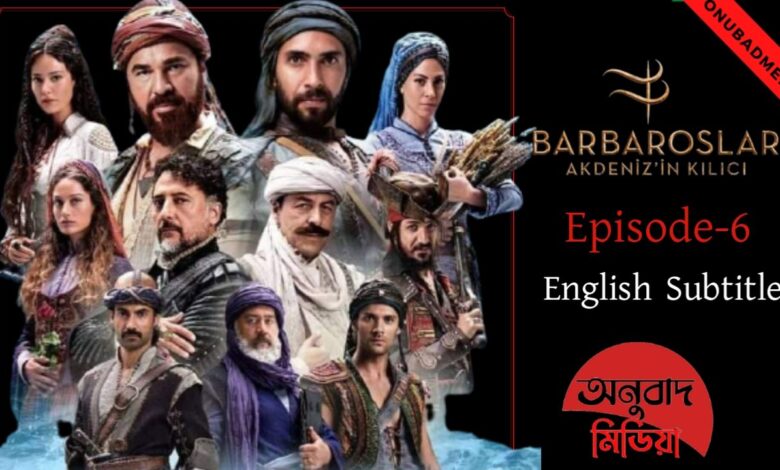
Barbaroslar episode 6 English subtitles
Many centuries before, the Romans had defeated their Semitic rivals the Carthaginians, and had established sway over this sea. Now, with the aid of an Asiatic race, the Turks, the people from North Africa were about to reap their revenge upon the descendants of the ancient Romans. The salt-sown ruins of Carthage, the islands, the cities, seaports, and trading posts of the ancient Phoenicians—slumbering under the drunken summer sun—must have raised a ghostly cheer.
So they came swanning down the soft sea to the city that was described by an Arab chronicler as “Tunis—the White, the Odoriferous, the Flowery Bride of the West.” (There were some unkind enough to say that the adjective “odoriferous” was not complimentary, but referred to the stinking salt pans and the oozy sewage-laden lagoons around the city.) The land homes of the Gulf of Tunis closed around the two captured ships and the towed galleot. Soon they saw ahead of them, rising out of the heat haze and the low-lying coastal belt, the white houses of the port that they had made their temporary home. “The wonder and astonishment,” says the sixteenth-century Spanish historian Diego Haedo, “that this notable exploit caused in Tunis, and even in Christendom, is not to be expressed, nor how celebrated the name of Aruj Rais became from that very moment; he being held and accounted, by all the world, as a most valiant and enterprising commander. And by reason, his beard was extremely red, or carroty, from thenceforwards he was generally called Barbarossa, which in Italian signifies Red- Beard.
2 – THE BARBAROSSA BROTHERS
The island of Lesbos hangs like a pendant on the ear of western Turkey. Rich and fertile, its capital, Mitylene, fronting the continent of Asia across a ten-mile-wide channel, it had been famous in antiquity as the home of the poetess Sappho. Lesbos had also long been renowned for the excellence of its wine and its olives. Around the great Gulf of Kalloni in the west stretch the fertile plains where the vines abound and where the olives ripple like a silver sea when the north wind spins their leaves. Behind the town of Mitylene itself, another large inlet makes an excellent port, safe from the gale-force Meltemi winds of midsummer. Throughout the Middle Ages Lesbos had remained a prosperous island, secure under the protection of the Byzantine Empire. But after the sack of Constantinople by the Venetians and soldiers of the Fourth Crusade in 1204, it had suffered a similar fate to all the other Aegean Islands. It had become a trading center dominated, as well as disputed over, by Venetian and Genoese. It was inevitable, with the decline of Christian power —Europe itself being divided into a number of warring states— that an island like Lesbos should attract the attention of the Turkish master of the Asian coast. After his capture of Constantinople in 1453, the triumphant Sultan Mehmet II began to occupy the islands of the Aegean. As the master of Constantinople, as well as of the mainland of Greece, he could hardly tolerate these Italian enclaves in what had now become a Turkish sea. Furthermore, the possession of Constantinople had at last given the Sultan a great seaport. For the first time in their history the Turks, predominantly land people, were faced with the necessity of creating a merchant navy, and a fighting navy to protect it. It was this, above all, which provided the main driving force behind their extraordinary naval expansion during the following century.
As for the islands, it was not only that the Sultan desired their revenues (and to be quit of Christians trading in his waters), but they had also become wasp nests of pirates. Mitylene itself was one of the most notorious havens for Catalan, Italian, and Sicilian pirates, who raided the other islands and swarmed around the mouth of the Dardanelles, preying on Turkish shipping. They even had the insolence to raid the mainland of the Sultan’s dominions and carry off Turkish citizens for sale as slaves in the marts of Venice and Genoa. A Sultan who was described as “Master of the East and West, the Possessor of Men’s necks, and the Peacock of the World” was not likely to tolerate such activities for long. With the aid of his recently formed navy, he began systematically occupying the islands. Little did the European pirates who had operated from them realize that they had “sown the wind and would reap the whirlwind.” As the Turks gradually spread into the Mediterranean world they were to produce a race of men that would make the activities of the Italian pirates in the Aegean look like children’s games. Among the islands of the Aegean, the Turks would learn—as had the ancient Greeks many centuries before them—the arts of navigation and seamanship. Thence they would expand throughout the whole Mediterranean until there would not be a European seaport safe from them. They would go so far as to threaten great inland cities so that even the Pope in Rome could not be sure that he wo
